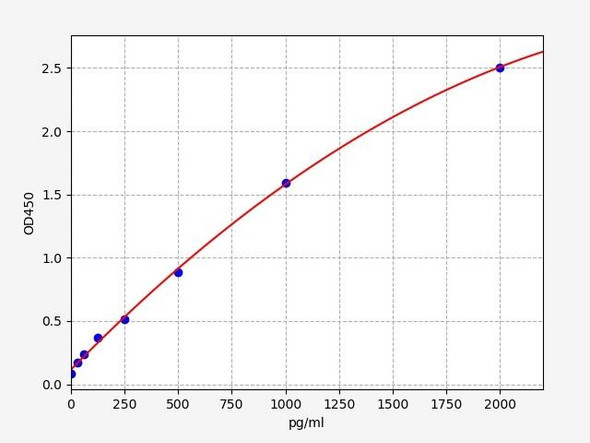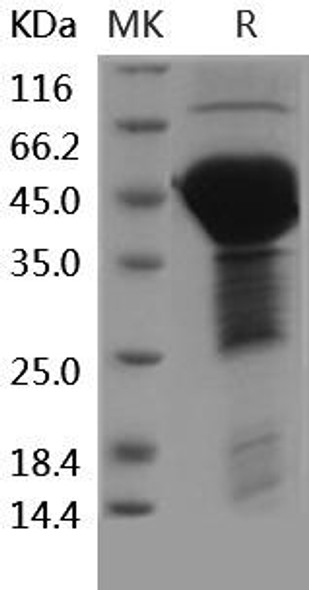Description
Mapt Antibody (PACO28174)
The MAPT Polyclonal Antibody (PACO28174) is a valuable tool for researchers studying the microtubule-associated protein tau (MAPT), which plays a significant role in neurodegenerative diseases such as Alzheimer's disease. This antibody is raised in rabbits and has high reactivity with human samples, making it ideal for use in Western blot applications.MAPT is a protein that stabilizes microtubules in neurons, and abnormal accumulation of tau protein is a characteristic feature of Alzheimer's disease and other tauopathies. By targeting the MAPT protein, researchers can investigate the mechanisms underlying neurodegeneration and potentially develop new therapeutic strategies for these devastating conditions.
With its ability to specifically bind to MAPT, the PACO28174 antibody enables accurate detection and analysis of tau protein in various cell types, making it a valuable tool for studies in neuroscience and neurology. Understanding the role of MAPT in neurodegenerative diseases is essential for advancing our knowledge of these conditions and developing effective treatments in the future.
| Antibody Name: | Mapt Antibody (PACO28174) |
| Antibody SKU: | PACO28174 |
| Size: | 50ug |
| Host Species: | Rabbit |
| Tested Applications: | ELISA |
| Recommended Dilutions: | |
| Species Reactivity: | Rat |
| Immunogen: | Recombinant Rat Microtubule-associated protein tau protein (2-752AA) |
| Form: | Liquid |
| Storage Buffer: | Preservative: 0.03% Proclin 300 Constituents: 50% Glycerol, 0.01M PBS, PH 7.4 |
| Purification Method: | >95%, Protein G purified |
| Clonality: | Polyclonal |
| Isotype: | IgG |
| Conjugate: | Non-conjugated |
| Background: | Promotes microtubule assembly and stability, and might be involved in the establishment and maintenance of neuronal polarity. The C-terminus binds axonal microtubules while the N-terminus binds neural plasma membrane components, suggesting that tau functions as a linker protein between both. Axonal polarity is predetermined by tau localization (in the neuronal cell) in the domain of the cell body defined by the centrosome. The short isoforms allow plasticity of the cytoskeleton whereas the longer isoforms may preferentially play a role in its stabilization. |
| Synonyms: | Microtubule-associated protein tau (Neurofibrillary tangle protein) (Paired helical filament-tau) (PHF-tau), Mapt, Mtapt Tau |
| UniProt Protein Function: | Tau: a microtubule-associated protein that regulates microtubule assembly and stability. Apparently involved in the establishment and maintenance of neuronal polarity. Mutations can result in several neurodegenerative disorders such as Alzheimer's disease, Pick's disease, frontotemporal dementia, cortico-basal degeneration and progressive supranuclear palsy. The C-terminus binds axonal microtubules while the N-terminus binds neural plasma membrane components, suggesting that tau functions as a linker. Axonal polarity is predetermined by tau localization (in the neuronal cell) in the domain of the cell body defined by the centrosome. Nine differentially spliced isoforms have been described. The short isoforms allow plasticity of the cytoskeleton, whereas the longer isoforms may preferentially play a role in its stabilization. |
| UniProt Protein Details: | Protein type:Cytoskeletal Chromosomal Location of Human Ortholog: 10q32.1 Cellular Component: axolemma; axon; axoneme; cell soma; cytoplasm; cytosol; dendrite; growth cone; internal side of plasma membrane; membrane; microtubule; microtubule associated complex; microtubule cytoskeleton; neuron projection; nuclear speck; nucleus; plasma membrane; postsynaptic density; tubulin complex Molecular Function:apolipoprotein binding; DNA binding; enzyme binding; Hsp90 protein binding; identical protein binding; microtubule binding; protein binding; protein complex binding; protein domain specific binding; protein homodimerization activity; protein kinase binding; protein phosphatase 2A binding; receptor agonist activity; SH3 domain binding Biological Process: adult walking behavior; apoptosis; axon cargo transport; axon extension; axonogenesis; brain development; female pregnancy; induction of apoptosis by oxidative stress; intracellular distribution of mitochondria; memory; microtubule cytoskeleton organization and biogenesis; mitochondrion transport along microtubule; negative regulation of intracellular transport; negative regulation of kinase activity; neurite development; neuron migration; positive regulation of axon extension; positive regulation of microtubule polymerization; positive regulation of superoxide release; regulation of autophagy; regulation of calcium-mediated signaling; regulation of microtubule polymerization or depolymerization; response to nutrient; response to organic substance; synapse organization and biogenesis |
| NCBI Summary: | a microtubule-associated protein; expression is found specifically in neurons [RGD, Feb 2006] |
| UniProt Code: | P19332 |
| NCBI GenInfo Identifier: | 13432197 |
| NCBI Gene ID: | 29477 |
| NCBI Accession: | P19332.3 |
| UniProt Secondary Accession: | P19332,Q63567, Q63677, Q9QW06, |
| UniProt Related Accession: | P19332 |
| Molecular Weight: | 80.4kD |
| NCBI Full Name: | Microtubule-associated protein tau |
| NCBI Synonym Full Names: | microtubule-associated protein tau |
| NCBI Official Symbol: | Mapt |
| NCBI Official Synonym Symbols: | Tau; pTau; Mtapt; RNPTAU |
| NCBI Protein Information: | microtubule-associated protein tau |
| UniProt Protein Name: | Microtubule-associated protein tau |
| UniProt Synonym Protein Names: | Neurofibrillary tangle protein; Paired helical filament-tau; PHF-tau |
| Protein Family: | Microtubule-associated protein |
| UniProt Gene Name: | Mapt |










